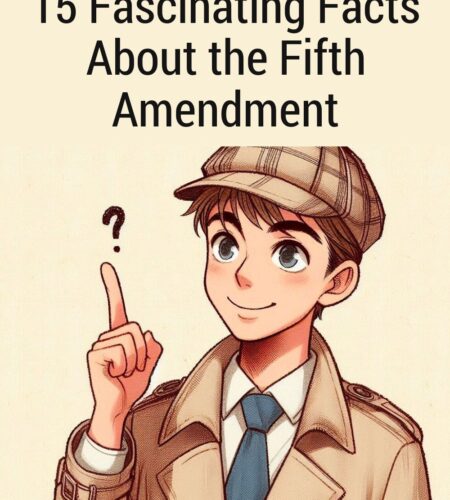The Fifth Amendment to the United States Constitution is a crucial part of American law, protecting citizens’ rights and ensuring a fair legal process. Here are 15 intriguing facts about the Fifth Amendment that shed light on its significance and impact.
Introduction
The Fifth Amendment, which is one of the first ten amendments to the U.S. Constitution, known as the Bill of Rights, plays a vital role in safeguarding the rights and liberties of American citizens. Let’s delve into these intriguing facts about the Fifth Amendment and its contributions to American jurisprudence.
Fact 1: The Origins of the Fifth Amendment
The English Common Law Roots: The Fifth Amendment has its origins in English common law and the Magna Carta, which sought to protect individuals from arbitrary government actions. It was designed to prevent the government from forcibly taking private property or imprisoning citizens without due process.
Incorporation into the Bill of Rights: The Fifth Amendment was ratified as part of the Bill of Rights on December 15, 1791, along with the other nine amendments that make up the first ten amendments to the U.S. Constitution.
Fact 2: The Right to Remain Silent
The Right to Silence: Perhaps the most famous aspect of the Fifth Amendment is the right to remain silent. It states that no person “shall be compelled in any criminal case to be a witness against himself.” This right allows individuals to avoid self-incrimination during legal proceedings.
“Taking the Fifth”: You’ve likely heard the phrase “taking the Fifth.” This colloquial term refers to invoking one’s right to remain silent to avoid self-incrimination.
Application in the Miranda Warning: The Fifth Amendment is a fundamental part of the Miranda warning, which police officers must read to suspects in custody. It ensures that individuals are aware of their right to remain silent during questioning.
Fact 3: Double Jeopardy Protection
Protection Against Double Jeopardy: The Fifth Amendment also protects individuals from being tried twice for the same offense, known as “double jeopardy.” This rule prevents the government from making repeated attempts to convict a person for the same crime.
Famous Cases: The protection against double jeopardy has played a significant role in some high-profile cases, including those of O.J. Simpson and the Central Park Five.
Exceptions to Double Jeopardy: While double jeopardy is generally prohibited, there are exceptions in certain circumstances, such as when a case is appealed or when separate jurisdictions prosecute the same offense.
Fact 4: The Grand Jury Requirement
The Grand Jury Clause: The Fifth Amendment stipulates that “No person shall be held to answer for a capital, or otherwise infamous crime, unless on a presentment or indictment of a grand jury.” This requirement means that for certain serious crimes, a grand jury must first decide whether there is enough evidence to proceed to trial.
Notable Exemptions: Not all criminal cases require a grand jury indictment. In many cases, the government can initiate charges through an information or complaint filed by a prosecutor.
The Unique Role of Grand Juries: Grand juries serve as an independent body to protect individuals from unwarranted prosecutions and ensure that the government has a legitimate case against the accused.
Fact 5: Eminent Domain and Just Compensation
The “Takings” Clause: The Fifth Amendment includes a provision stating that “nor shall private property be taken for public use, without just compensation.” This is often referred to as the “takings” clause and is a cornerstone of property rights in the United States.
Eminent Domain: Eminent domain allows the government to take private property for public use, such as building roads, schools, or public utilities. However, the government must provide fair compensation to the property owner.
Controversies Surrounding Eminent Domain: The use of eminent domain for private development projects, like shopping centers or hotels, has been a source of controversy and debate, raising questions about the boundaries of the “public use” requirement.
Fact 6: Protection Against Self-Incrimination
The Right to Avoid Self-Incrimination: The Fifth Amendment’s self-incrimination clause protects individuals from being forced to testify against themselves in a criminal case. It’s a fundamental protection of personal liberty.
Famous Cases: The protection against self-incrimination has been invoked in numerous famous cases, including the McCarthy hearings, the Watergate scandal, and the “Hollywood Ten” during the Red Scare.
The Miranda Warning: The famous “right to remain silent” warning is a practical application of the protection against self-incrimination, ensuring that individuals are aware of their rights during police interrogations.
Fact 7: Due Process of Law
The Guarantee of Due Process: The Fifth Amendment ensures that no person can be deprived of “life, liberty, or property, without due process of law.” This principle underlines the importance of a fair legal process before anyone can be deprived of their fundamental rights.
Due Process in Civil and Criminal Cases: Due process applies not only to criminal proceedings but also to civil cases, ensuring fairness in various legal contexts.
Protection Against Arbitrary Actions: Due process serves as a safeguard against arbitrary government actions and helps protect individuals from unwarranted loss of life, liberty, or property.
Fact 8: The Fifth Amendment and Civil Forfeiture
Civil Forfeiture Controversy: Civil forfeiture is a legal process that allows law enforcement to seize assets suspected of being involved in criminal activity, even without a criminal conviction. Critics argue that it can be an abuse of power and a violation of the Fifth Amendment.
Protecting Property Rights: The Fifth Amendment’s “takings” clause and due process protections play a role in the ongoing debate over civil forfeiture, as they emphasize the importance of protecting property rights.
Reform Efforts: Over the years, there have been efforts to reform civil forfeiture laws to better align with the principles of the Fifth Amendment and protect innocent property owners.
Fact 9: The Grand Jury in Federal Cases
Limited Application in Federal Cases: While the Fifth Amendment’s grand jury requirement is incorporated into federal law, it is not binding on states. States can choose whether to use grand juries in their criminal justice systems.
States and Indictments: In many states, a grand jury indictment is not required for criminal charges to be filed, and cases can proceed with information or complaints filed by prosecutors.
Varied Practices: The use of grand juries in criminal cases varies widely across the United States, with some states relying on them more heavily than others.
Fact 10: The Fifth Amendment and the Military
Application to Military Courts: The Fifth Amendment protections extend to military courts, ensuring that members of the armed forces are guaranteed due process and other fundamental rights.
Military Trials and Tribunals: The Fifth Amendment’s presence in military law is especially significant when it comes to military trials and tribunals, ensuring that military personnel are afforded legal protections.
Balancing National Security: While the Fifth Amendment’s principles remain essential, the military justice system sometimes balances these rights with the demands of national security and military discipline.
Fact 11: The “Pleading the Fifth” Stereotype
Pop Culture and “Pleading the Fifth”: The act of “pleading the Fifth” is a common trope in American pop culture and legal dramas. It often involves witnesses or defendants refusing to answer questions to avoid self-incrimination.
Reality vs. Stereotype: While “pleading the Fifth” is widely recognized, it may not always play out exactly as portrayed in television or film. In real legal proceedings, individuals must carefully consider how to exercise their Fifth Amendment rights.
Complex Legal Decisions: Deciding whether to “plead the Fifth” is a nuanced legal decision that involves weighing the potential consequences and legal strategy.
Fact 12: The Fifth Amendment and Technology
Modern Applications: The Fifth Amendment’s protections have been extended to modern technology and digital data. Individuals can invoke the Fifth Amendment to protect their passcodes and encryption keys from being used against them.
Challenges in the Digital Age: With the increasing reliance on digital devices and technology, the intersection of the Fifth Amendment and digital privacy has become a complex and evolving legal issue.
Ongoing Legal Debates: Courts continue to grapple with how the Fifth Amendment applies in cases involving digital evidence and encryption.
Fact 13: The Fifth Amendment’s Impact on High-Profile Cases
Influential Cases: The Fifth Amendment has played a significant role in shaping the outcomes of various high-profile cases, including the trials of John Gotti, Martha Stewart, and more recently, the investigation into Russian interference in the 2016 U.S. presidential election.
Legal Strategies: Attorneys often employ the Fifth Amendment strategically to protect their clients’ rights and navigate the complexities of the legal system.
Public Scrutiny: High-profile cases that involve the Fifth Amendment often receive intense media attention and public scrutiny.
Fact 14: Balancing Rights and Justice
The Balance of Interests: The Fifth Amendment represents a balance between individual rights and the government’s interest in conducting criminal investigations and prosecutions.
Ensuring Fairness: By protecting against self-incrimination, ensuring due process, and safeguarding property rights, the Fifth Amendment helps maintain a just and fair legal system.
Evolving Interpretations: The interpretation and application of the Fifth Amendment continue to evolve as legal and societal contexts change.
Fact 15: The Fifth Amendment’s Global Influence
International Impact: The concept of protection against self-incrimination and the guarantee of due process, rooted in the Fifth Amendment, has influenced legal systems and human rights standards worldwide.
Human Rights Conventions: Many international human rights conventions and treaties incorporate principles akin to those found in the Fifth Amendment, emphasizing the global importance of these legal safeguards.
Promoting Justice and Fairness: The Fifth Amendment’s influence extends beyond the borders of the United States, advocating for justice, fairness, and the protection of individual liberties on a global scale.
Conclusion
The Fifth Amendment to the United States Constitution is a cornerstone of American law, embodying principles of fairness, justice, and individual rights. By exploring these 15 fascinating facts about the Fifth Amendment, we gain a deeper understanding of its historical origins, contemporary applications, and its enduring impact on American jurisprudence. Whether protecting the right to remain silent, ensuring due process, or guarding against self-incrimination, the Fifth Amendment remains a crucial safeguard of individual liberties in the United States and beyond.
Subscribe to our email newsletter to get the latest posts delivered right to your email.





Comments